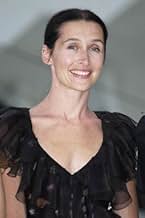IMDb-BEWERTUNG
6,3/10
2483
IHRE BEWERTUNG
Zwei Kontinente und drei Jahrhunderte umfasst diese Geschichte über zwei Brüder im Wilden Westen, einen mazedonischen Revolutionär im Kampf gegen die Türken, eine schöne Schwangere, einen Ne... Alles lesenZwei Kontinente und drei Jahrhunderte umfasst diese Geschichte über zwei Brüder im Wilden Westen, einen mazedonischen Revolutionär im Kampf gegen die Türken, eine schöne Schwangere, einen New Yorker Dieb und eine knallharte Hundertjährige.Zwei Kontinente und drei Jahrhunderte umfasst diese Geschichte über zwei Brüder im Wilden Westen, einen mazedonischen Revolutionär im Kampf gegen die Türken, eine schöne Schwangere, einen New Yorker Dieb und eine knallharte Hundertjährige.
- Regie
- Drehbuch
- Hauptbesetzung
- Auszeichnungen
- 1 Nominierung insgesamt
Joseph Mosso
- Church bell
- (as Joe Mosso)
Empfohlene Bewertungen
After having read some reviews of 'Dust' I was not sure if I wanted to see it or not. However, the "David Wenham infatuation" prevailed in the end, and I went as far as to actually purchase the film. It was money well spent, you could say. While the movie would not appeal to general audiences, it left me awestruck. I ended up watching it again, on the same night.
"Wow" is how I describe feeling after the credits rolled (the first and the second time). I don't want to spoil anything for those who have not seen the movie, so I'll just stick to my reactions to it. There was laughter, there were tears, there might have been an "eww" once or twice, there were definitely lustful thoughts of David Wenham (he's rather cute, you know). Acting was superb, though I'd like a few words with the 'dialect coach' (hint: the leads are not American). All in all, a great movie. I highly recommend seeing it at least once.
"Wow" is how I describe feeling after the credits rolled (the first and the second time). I don't want to spoil anything for those who have not seen the movie, so I'll just stick to my reactions to it. There was laughter, there were tears, there might have been an "eww" once or twice, there were definitely lustful thoughts of David Wenham (he's rather cute, you know). Acting was superb, though I'd like a few words with the 'dialect coach' (hint: the leads are not American). All in all, a great movie. I highly recommend seeing it at least once.
Milcho Manchevski establishes new guidelines for independent movie makers, successfully balancing between Hollywood commercial and the independent art film. Only few compromises and hybrids like this have proven worth filming (and watching) and I was pleasantly surprised with the outcome.
First of all, there was the careful choice of names - Luke and Elijah (biblical names) opposed to the prostitute Lilith (female demon). No wonder that Lilith was in so many ways connected with water and finally she drowned. Than, there's Neda (from an old Macedonian poem "Serdarot" by Grigor Prlichev, awarded first prize at Athens). Then, a thing which impressed me was the short appearance of certain characters like Sigmund Freud, Pablo Picasso and Josip Broz Tito. Manchevski has used his old "trick" from his first film "Before the Rain" - non-linear time, but while in "Before the rain" the explanation was "The circle is not round, time never dies" in "Dust" it is "The centuries do not follow up each other but coexist like parallel universes".
Repentance was an important motif in the movie, especially the repentance of Luke and Edge.
Certain scenes have moved me, the scene in the hospital when Angela dies and the nurse is asking Edge what is he to her... The scene in Macedonia, when the women are laundering the carpets on a rocky waterfall (Mariovo)... And another thing - me as a Macedonian have always been brought up with the notion that our freedom fighters were noble men who were usually victims of blood thirsty Turks, but this movie had an interesting point that they were all butchers and murderers whose only lust is not freedom or fight against oppression but GOLD!
Probably this movie doesn't have the prophetic touch of "Before the rain" clearly displayed in the current political situation in Macedonia, but there's again the scene with Albanian gangs killing innocent Macedonian cattle breeders.
And another thing - both Angela and Luke are mocking the official clerical (church) "authorities", when Angela refuses the confession of the catholic priest on her death bed and when Luke kills the local orthodox priests offering assistance in the negotiations with the Turks (by the way, the priest is a traitor, which questions another illusion of mine and my generation - that the priests and the Church have been very active in protecting the Macedonian villagers from oppression and torment).
I know one thing for sure - that as soon as I am able I will use my proud privilege to be a Macedonian and visit Mariovo, where a part of the movie was made, and especially the bridge where the Turks attempted to pass so many times during the 17-th century and did not succeed.
The tension seems to fade at some points and that's why the rate of "9" form my user's vote, but still, this is an excellent complete product, made with the touch of perfect craftsmanship.
First of all, there was the careful choice of names - Luke and Elijah (biblical names) opposed to the prostitute Lilith (female demon). No wonder that Lilith was in so many ways connected with water and finally she drowned. Than, there's Neda (from an old Macedonian poem "Serdarot" by Grigor Prlichev, awarded first prize at Athens). Then, a thing which impressed me was the short appearance of certain characters like Sigmund Freud, Pablo Picasso and Josip Broz Tito. Manchevski has used his old "trick" from his first film "Before the Rain" - non-linear time, but while in "Before the rain" the explanation was "The circle is not round, time never dies" in "Dust" it is "The centuries do not follow up each other but coexist like parallel universes".
Repentance was an important motif in the movie, especially the repentance of Luke and Edge.
Certain scenes have moved me, the scene in the hospital when Angela dies and the nurse is asking Edge what is he to her... The scene in Macedonia, when the women are laundering the carpets on a rocky waterfall (Mariovo)... And another thing - me as a Macedonian have always been brought up with the notion that our freedom fighters were noble men who were usually victims of blood thirsty Turks, but this movie had an interesting point that they were all butchers and murderers whose only lust is not freedom or fight against oppression but GOLD!
Probably this movie doesn't have the prophetic touch of "Before the rain" clearly displayed in the current political situation in Macedonia, but there's again the scene with Albanian gangs killing innocent Macedonian cattle breeders.
And another thing - both Angela and Luke are mocking the official clerical (church) "authorities", when Angela refuses the confession of the catholic priest on her death bed and when Luke kills the local orthodox priests offering assistance in the negotiations with the Turks (by the way, the priest is a traitor, which questions another illusion of mine and my generation - that the priests and the Church have been very active in protecting the Macedonian villagers from oppression and torment).
I know one thing for sure - that as soon as I am able I will use my proud privilege to be a Macedonian and visit Mariovo, where a part of the movie was made, and especially the bridge where the Turks attempted to pass so many times during the 17-th century and did not succeed.
The tension seems to fade at some points and that's why the rate of "9" form my user's vote, but still, this is an excellent complete product, made with the touch of perfect craftsmanship.
`Dust' is a movie filled with blood, guts, death, doom and despair. In fact, one would be hard pressed to think of a movie with a more depressing story line than this one. The body count is very high, and you can believe it when I say no one dies pretty in this movie. So, you don't want to watch it during dinner.
The basic plot is that of two cowboy brothers during the late 1900s; one of a good heart, and one with not such a good heart. However, there are a multitude of sub stories which finally come together in the end. It's just getting to the ultimate tie in at the end of the movie, without getting somewhat confused, that's hard. The story is told from the point of view of an old woman, living in the present day, in flashback form, as she describes events that took place at the turn of the last century. Every few minutes, the story line shifts from character to character and time to time. These constant jumps make the movie a bit hard to keep up with, and is the main flaw in the film.
Even though the movie is confusing, it does all come together in the end. And at the end, one feels a certain satisfaction when that little `aw, now I get it' light comes on; and that little light makes `Dust' almost worth watching.
The basic plot is that of two cowboy brothers during the late 1900s; one of a good heart, and one with not such a good heart. However, there are a multitude of sub stories which finally come together in the end. It's just getting to the ultimate tie in at the end of the movie, without getting somewhat confused, that's hard. The story is told from the point of view of an old woman, living in the present day, in flashback form, as she describes events that took place at the turn of the last century. Every few minutes, the story line shifts from character to character and time to time. These constant jumps make the movie a bit hard to keep up with, and is the main flaw in the film.
Even though the movie is confusing, it does all come together in the end. And at the end, one feels a certain satisfaction when that little `aw, now I get it' light comes on; and that little light makes `Dust' almost worth watching.
I do not understand why people try to comprehend this movie as a real-life story, because there are many "hints" telling viewers not to do so - photographs with characters from different epochs together, modern airplane flying over Macedonia at the beginning of twentieth century, etc. - even the sarcastic homage to spaghetti-western tradition ("hero" killing six or seven people with a single bullet)... In my opinion, it should be viewed as a story about human souls, their connection through time and space, about human fate, where main character, although ill-natured, was "sent by destiny" to a far-away land to do the good deed of his life (Elijah's decision to save life of Macedonian rebel's child at the end of the movie looks more like being driven by some irrational then rational force).
The movie also has its point picturing the way westerns see (and saw) Balkan area - as a confusing battleground where everyone have there objectively justifiable reasons to think they are right - making the whole picture far from "black and white". Still, the "western people" come to do their own business (collect the gold), but end up in a completely different connection with people and territory... Personally, I did not like characters of Edge and Angela, in my opinion they are built as clichés with no good reason. On the other hand, characters of two cowboys, as well as Turkish gang-soldiers and Corto Maltese (comic-book figure well known in Europe), built as stereotypes, perfectly fill the sarcastic, humorous attitude of Filmmaker on profane observance of life...
The movie also has its point picturing the way westerns see (and saw) Balkan area - as a confusing battleground where everyone have there objectively justifiable reasons to think they are right - making the whole picture far from "black and white". Still, the "western people" come to do their own business (collect the gold), but end up in a completely different connection with people and territory... Personally, I did not like characters of Edge and Angela, in my opinion they are built as clichés with no good reason. On the other hand, characters of two cowboys, as well as Turkish gang-soldiers and Corto Maltese (comic-book figure well known in Europe), built as stereotypes, perfectly fill the sarcastic, humorous attitude of Filmmaker on profane observance of life...
In modern New York, a thief (Adrian Lester) breaks into an old woman's apartment. She surprises him and holds him at gunpoint. She tells him the story about two brothers in the turn of the century. Elijah (Joseph Fiennes) and Luke (David Wenham) have a breakdown in relationship. Luke is drawn to the wild east in Macedonia where the Ottoman is battling a local revolt. He joins a group of bandits pursuing the revolt leader known as The Teacher for the lucrative reward. He gets taken prisoner by the Turks who is joined by his hated brother.
Filmmaker Milcho Manchevski has taken on too much for one movie. It's trying to do too much and ends up stepping on each other. It may work better as an old style violent spaghetti western. Even taken separately, the narrative flow is a bit disjointed. The modern part only adds the trans-generational story. The robbery part isn't that compelling. Without knowing either character, there is nothing to root for or against. It's often problematic to have a character tell the story of the movie. The reliability of the telling is suspect. It's also trying to have some surreal poetry about flying. It's doing too much and gets muddled. This is definitely ambitious and probably too ambitious for its own good.
Filmmaker Milcho Manchevski has taken on too much for one movie. It's trying to do too much and ends up stepping on each other. It may work better as an old style violent spaghetti western. Even taken separately, the narrative flow is a bit disjointed. The modern part only adds the trans-generational story. The robbery part isn't that compelling. Without knowing either character, there is nothing to root for or against. It's often problematic to have a character tell the story of the movie. The reliability of the telling is suspect. It's also trying to have some surreal poetry about flying. It's doing too much and gets muddled. This is definitely ambitious and probably too ambitious for its own good.
Wusstest du schon
- WissenswertesDust caused quite a stir when it premiered. A number of European critics viewed Manchevski's film as an extension of his recent op-ed piece in The Guardian. The op-ed asked NATO to take responsibility for a civil war in his homeland Macedonia - even though Dust was finished before the war even began.
- PatzerThe old woman Angela's (Rosemary Murphy) refrigerator dispenses the gold coins from the story, even though they were all scattered at the Turkish camp by Luke (David Wenham) when he came for Neda (Nikolina Kujaca).
Top-Auswahl
Melde dich zum Bewerten an und greife auf die Watchlist für personalisierte Empfehlungen zu.
- How long is Dust?Powered by Alexa
Details
- Erscheinungsdatum
- Herkunftsländer
- Offizieller Standort
- Sprachen
- Auch bekannt als
- Cenizas y pólvora
- Drehorte
- Produktionsfirmen
- Weitere beteiligte Unternehmen bei IMDbPro anzeigen
Box Office
- Budget
- 11.000.000 $ (geschätzt)
- Weltweiter Bruttoertrag
- 108.698 $
- Laufzeit2 Stunden 7 Minuten
- Farbe
- Sound-Mix
- Seitenverhältnis
- 1.85 : 1
Zu dieser Seite beitragen
Bearbeitung vorschlagen oder fehlenden Inhalt hinzufügen
































